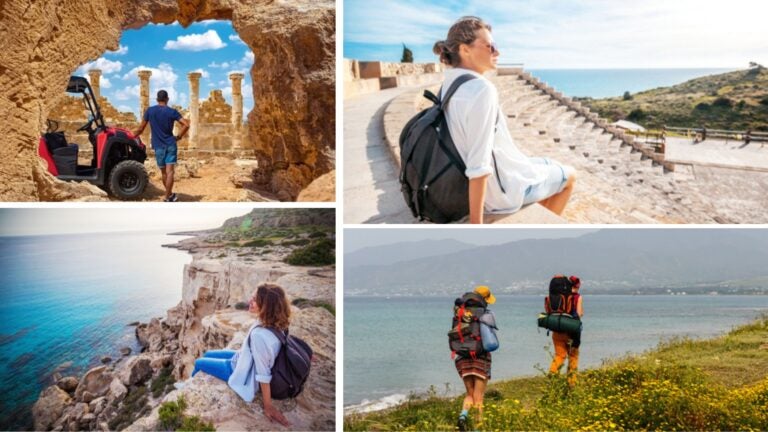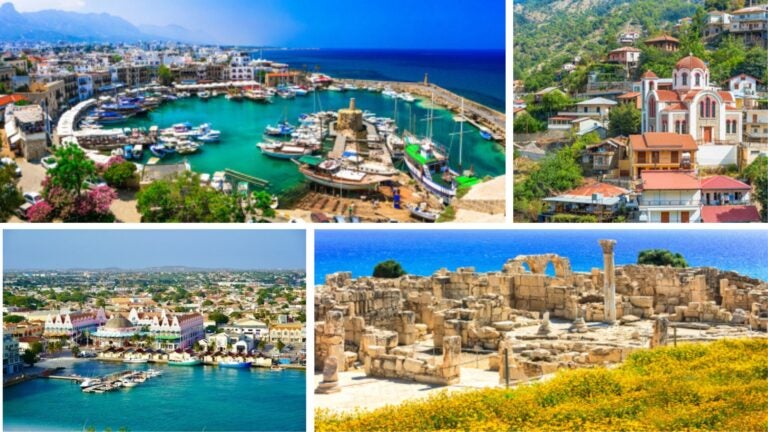Live in Cyprus: Learn advantages, disadvantages & costs
Are you looking for new horizons? Then, learning about what it's like to live in Cyprus can help you discover what the island has to offer.
About 113 kilometers off the Turkish coast, Cyprus has quietly become a Mediterranean hotspot for digital nomads, remote professionals, retirees and freelancers. The island attracts Europeans eager to enjoy more than 300 days of sunshine, swim in crystal-clear waters and settle into its warm, easygoing lifestyle. But Cyprus is far more than a holiday escape. If you ever get the chance to live in Cyprus, even for a season, it is an experience well worth seizing.
This small island nation, a member of the European Union, blends the best of European living with a touch of Middle Eastern culture. More and more people are choosing to live in Cyprus thanks to its affordable cost of living, strong international connections and excellent quality of life in the heart of the Mediterranean. Still, it is worth looking at the bigger picture and keeping in mind the challenges that can come with relocating to Cyprus.
That’s why today we’re giving you a closer look at what it’s really like to live in Cyprus: from the quality of its public healthcare and the opportunities in its job market, to how its costs compare with other European destinations, plus the pros and cons of settling on the island and much more. Ready to find out if this Mediterranean gem could be your next home?
What is the quality of life like in Cyprus?
Cyprus offers an enviable quality of life, and there are many reasons for it. We will explore those in more detail, but one stands out right away and it has little to do with healthcare, education or how straightforward it is to get residency. What truly makes a difference is the hospitality of the Cypriot people. Inspired by age old Greek traditions of welcoming guests, this warmth makes newcomers feel at home almost instantly. Daily life here is centered on sharing food, enjoying good company, celebrating friendships and keeping work in its proper place, life first and work second.
This relaxed and easygoing lifestyle is complemented by the island’s safety, pleasant weather and reasonable costs. It is no wonder that more and more people are choosing Cyprus as a place to settle, whether for a season or permanently. Did you know it has the second highest proportion of foreign residents in the EU?
Get comfortable and start taking notes, because we are about to break down the many factors that shape life in Cyprus. How education, healthcare, work and digital systems operate, how salaries compare to the cost of living, and the everyday habits that make living here such an enjoyable experience.
1- Education in Cyprus
The Cypriot education system is organized much like those in other European Union countries. Schooling is free and compulsory from ages six to fifteen, and families can choose between public, private and international schools, many of which offer programs in English or French.
For international families, international schools are usually the most convenient choice, especially in cities like Nicosia, Limassol and Larnaca. Some of the most prestigious ones offer the International Baccalaureate (IB) and follow British or American curricula. When it comes to costs, they tend to be more affordable than in most European countries. So if you are moving to Cyprus with school-aged children, the following details will be especially useful.
- Public schools: Free, although fees are charged for materials, field trips, and school meals.
- Private/international schools: Between $4,600 and $11,600 per year, depending on the level and language of instruction.
- Universities: Cyprus has both public and private universities that offer degree programs in English. Annual tuition fees for international students range from about $3,800 to $8,600, and there are also scholarship opportunities and Erasmus exchange agreements available.
2- Safety and community life
Safety is one of the first concerns for anyone thinking about relocating. The good news is that Cyprus is among the safest countries in Europe. According to Numbeo, its crime rates are some of the lowest on the continent. The cities are calm, violent crime is virtually unheard of, and walking at night rarely poses any risk. Solo female travelers, retirees and families with young children especially appreciate this secure environment.
Day-to-day life in Cyprus is also very pleasant. The warmth and hospitality of Cypriots are well known throughout the Mediterranean, and while Greek is the official language, English is widely spoken, especially in tourist areas and larger cities.
3- Cost of living in Cyprus
Although costs vary depending on location, living in Cyprus is generally more affordable than in other Mediterranean countries such as Italy, France or Spain. According to Eurostat, prices are about 10% lower than the EU average, especially when it comes to housing, food and everyday services. And if you choose to live outside the main tourist hubs or areas with high demand from foreigners, the difference is even more noticeable.
Renting an apartment in Cyprus is far cheaper than in most other EU countries. For example, a one bedroom place typically starts at around $430 a month. Utilities such as water, electricity and internet usually add another $110 to $160. Groceries and dining out for a month come to about $270 to $380, while getting around, whether by renting a car or using public transport, costs anywhere from $65 to $160.
Overall, a single person can live comfortably in Cyprus on a monthly budget of around $1,100 to $1,500, depending on lifestyle, city and type of housing.
4- Job market and salaries
While Cyprus does not have as large a job market as some other European countries, there are opportunities in fields such as tourism, technology, finance, education and healthcare. It is also an appealing destination for digital nomads working for foreign clients, especially because of the option to obtain a remote work visa.
Average salaries in Cyprus are lower than in Western Europe, but as you may expect, so is the cost of living. The minimum wage is around $1,100 per month, while skilled professionals, especially in IT or banking, can earn $2,200 to $3,300 a month.
Cyprus also offers tax incentives for remote workers and digital nomads, including the option of temporary residency in addition to a visa, as well as tax benefits for those who stay on the island for more than six months a year.

5- Lifestyle and healthy habits
Life in Cyprus is relaxed, active and healthy. The Mediterranean diet, rich in fresh fish, olive oil, seasonal fruits, legumes and vegetables, is considered one of the healthiest in the world.
The island’s mild, sunny weather makes it easy to spend time outdoors and enjoy nature. People often take walks, go for runs, play beach sports or hike in the mountains. Wellness is also a big part of life here, with gyms, thermal spas, yoga, pilates and holistic therapies widely enjoyed by both locals and newcomers.
6- Healthcare system in Cyprus
Cyprus offers a mixed healthcare system. Through the national GESY program, both citizens and foreign residents with a permit can access medical care. Residents make a small monthly contribution based on their income and can use public hospitals and affiliated clinics for most healthcare needs.
Estimated costs are:
- Contribution to GESY: Around 2.65% of gross monthly salary.
- General consultation in a public hospital (with GESY): $9-17.
- Private care without insurance: Between $46-81 per consultation.
Many foreigners also choose to take out additional health insurance, either to access more comfortable private clinics or for those who have not yet obtained legal residency.
Cyprus offers high quality healthcare and its World Health Organization ranking of 24th worldwide, above Germany, Canada and the United States, says a lot. The island is well known for specialties like plastic surgery, fertility treatments, dentistry, cardiology and orthopedics, as well as spinal care, recovery and rehabilitation.
7- Internet connectivity and digital life
Digital infrastructure in Cyprus has improved significantly in recent years. Most households now have access to broadband internet with speeds ranging from 50 to 300 Mbps, and major providers offer fiber optic connections in both urban and suburban areas. Mobile coverage is strong, with widespread 4G and an increasing number of 5G hotspots, especially in the larger cities.
Cyprus is a great place for remote work. You will find plenty of coworking spaces and cafes with fast WiFi, programs for digital nomad residency, and networks to connect with other professionals. Many everyday services are also online, from digital banking and delivery apps to government procedures that can be completed over the internet.
To take full advantage of everything Cyprus has to offer, a Holafly monthly plan can keep you connected from day one. Its global eSIM provides unlimited data, lets you share internet across devices, and powers everything from maps and translations to video calls. It is ideal for remote workers or anyone just starting life on the island.
Important: If you are a frequent traveler and want to stay connected without worrying about expensive roaming or looking for a new SIM at every destination, Holafly’s subscription plans are for you. With a single eSIM, enjoy internet in more than 170 countries for a fixed price and no surprises on your bill. Travel without limits and connect easily and securely! 🚀🌍

What are the advantages and disadvantages of living in Cyprus?
Cyprus can really take you by surprise. For such a small island, it offers a wonderful lifestyle, reliable infrastructure, great weather and a growing international community. Of course, life here has its challenges too, and it is useful to be aware of them before moving. Here is a look at the highlights and the less ideal aspects of living in this Mediterranean gem.
Advantages of living in Cyprus
- Good weather all year round: With over 300 days of sunshine a year, mild winters and long summers, the weather is one of the island’s biggest draws. If you love spending time outdoors, enjoying the beach and warm temperatures, life in Cyprus is likely to be a perfect fit.
- Affordable cost of living: Living in Cyprus is cheaper than in much of Europe, especially compared with places like France, Germany or the United Kingdom. Costs for rent, transport, food and leisure are reasonable, even in the bigger cities. If you want to save on housing, however, it is better to avoid Nicosia.
- Relaxed, safe, and multicultural lifestyle: Life in Cyprus is calm and relaxed. There are no huge crowds, traffic is manageable, and the overall atmosphere is peaceful. On top of that, it is one of the safest countries in Europe, making it ideal for families, retirees and solo travelers. Being a popular destination for foreigners also means you will meet people from all over the world, making it easier to build both social and professional networks.
- Good connectivity and digital services: Reliable internet, solid mobile networks, plenty of coworking spaces and apps for everything you need. If you work remotely or run a digital business, Cyprus makes it easy to stay connected and productive.
- A country rich in history and nature: Cyprus is full of stunning beaches, a top level food scene with some of the best restaurants in Europe, and countless wine routes. The mountainous interior is perfect for hiking, while its rich history is visible in archaeological sites, three of which are UNESCO World Heritage, as well as Byzantine churches and monasteries.

Disadvantages of living in Cyprus
- Limited job market: Job opportunities in Nicosia are more limited than in other European capitals, especially if you do not speak Greek. Most positions are in tourism, education, technology or finance. A better place to find work is Limassol, on the southern coast of the island.
- Poor public transportation outside cities: While there are buses in urban areas, public transport is limited outside the cities. To get around freely, you will likely need to rent or buy a car, especially if you live in villages or rural areas.
- Variable air and water quality: In the summer, high temperatures and dry conditions can lead to dust buildup or mild pollution, particularly in urban areas. Tap water is safe to drink, but it can have a strong taste in some regions, so many people choose to use filters or buy bottled water.
- Slow procedures and bureaucracy: Even though many processes in Cyprus have gone digital, some procedures still require patience. Bureaucracy can be slower than in other EU countries, particularly when dealing with public offices or immigration matters.
- Local language outside tourist areas: People commonly speak English in tourist areas, but outside those spots, you need to know Greek to fully settle in. Many signs, menus and forms are only in Greek, which can make everyday tasks a bit tricky if you are not familiar with the language.
So… is it worth living in Cyprus?
If you are looking for a relaxed lifestyle with pleasant weather, amazing landscapes and reasonable living costs, Cyprus could be the perfect choice. The island combines safety, beautiful beaches and a friendly culture with access to European services, reliable internet and a vibrant international community.
Living in Cyprus comes with its challenges too. Bureaucracy can be slow, the local language takes time to master, and the job market is limited without a clear plan. Still, if your aim is to study, work remotely, launch a business, or simply enjoy a quieter life closer to nature, the island has a lot to offer. Cyprus is more than a holiday destination, it is a place where you can really live well. And that might be exactly what you are looking for.
Frequently asked questions about living in Cyprus
The official language of Cyprus is Greek, while Turkish is spoken in the northern part of the island, which is under Turkish control. English, however, is widely used, especially in cities, tourist areas and professional settings. Many forms, signs and services are available in English, but learning a few phrases in Greek can make it easier to settle in and connect with locals.
It depends on your nationality. EU citizens can live in Cyprus without a visa, only needing to register if they plan to stay long term. Non-EU nationals will need to apply for the appropriate visa, whether it is for work, study, family reunification, or temporary residence. The island also offers special permits for digital nomads and retirees.
Absolutely. Cyprus offers fast internet, an affordable cost of living, great weather, and a growing international community of digital nomads and entrepreneurs. There are also coworking spaces, local networking opportunities, and attractive residency and tax options for remote workers who want to settle legally.
Limassol is a favorite among expats. Located on the southern coast, it has a modern, cosmopolitan atmosphere, good job and business opportunities, and a lively international community. The city also boasts plenty of attractions and a wide range of things to do for fun and leisure.





 Language
Language 


















 No results found
No results found








